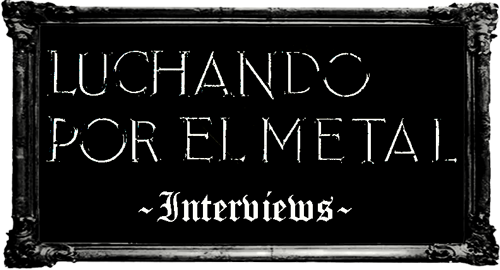An interview with Marco Ciargo, lead guitarist and founder of Resistencia
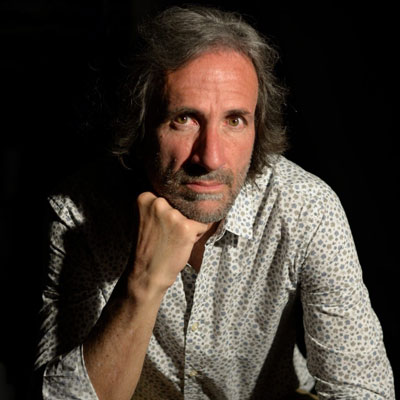 It is truly exciting to speak with Marco Tulio Ciargo, lead guitarist and founder of Resistencia. Ciargo moved to Europe many years ago. Although he left the heavy metal/hard rock scene in the late 1980s, he's still musically active. Most recently, he recorded the guitars for a progressive/neo-classical EP by Leo Carnicella titled Until a New Dawn. I had several questions about the band which Ciargo answered in a previous interview with The Corroseum back in 2002-2003. However, it would be interesting to elaborate on some of those answers.
It is truly exciting to speak with Marco Tulio Ciargo, lead guitarist and founder of Resistencia. Ciargo moved to Europe many years ago. Although he left the heavy metal/hard rock scene in the late 1980s, he's still musically active. Most recently, he recorded the guitars for a progressive/neo-classical EP by Leo Carnicella titled Until a New Dawn. I had several questions about the band which Ciargo answered in a previous interview with The Corroseum back in 2002-2003. However, it would be interesting to elaborate on some of those answers.
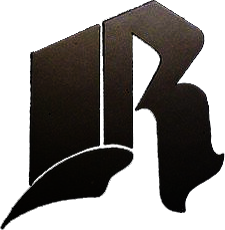 Resistencia always had an original sound. The closest comparisons I can think of are Rainbow, Judas Priest, and Rush. Starting with your second album, the progressive rock influences become stronger and you even include folk music in your sound. In recent years, you have composed symphonic poems for orchestra and electric guitar. What influenced Resistencia apart from hard and progressive rock? Are the folk influences from Venezuelan artists like Alí Primera?
Resistencia always had an original sound. The closest comparisons I can think of are Rainbow, Judas Priest, and Rush. Starting with your second album, the progressive rock influences become stronger and you even include folk music in your sound. In recent years, you have composed symphonic poems for orchestra and electric guitar. What influenced Resistencia apart from hard and progressive rock? Are the folk influences from Venezuelan artists like Alí Primera? Marco:
Progressive rock was more present in my world than in those of my bandmates, just how the folkloric influence came from César who liked Gualberto Ibarreto a lot, however, we all agreed on using some elements to give the band a more autochtonous identity.
Sounds like Resistencia was poised for originality from the beginning. Each member brought in their own influences to the band and had the explicit agreement that the band would distinctly Venezuelan.
Was it hard to get albums from foreign bands back then?
Marco:
It wasn't hard. Back in the 70s, we got the most important stuff that was released at the time with a few exceptions such as albums that weren't well known in the country. Nonetheless, starting in the 1980s, the first works of the first NWOBHM bands weren't easy to get. I had stopped buying records by then. Nonetheless, friends of Rodrigo's brother brought material straight from London which we as a band heard through Rodrigo himself.
Right. Compared to other Latin American countries, Venezuela's socioeconomic situation back then made it easier to access the new sounds from Europe and the USA.
I suppose mellower rock bands already existed in Venezuela in the early 70s. Were you influenced by any of these local bands?
Marco:
Yes, there were, but none that influenced us.
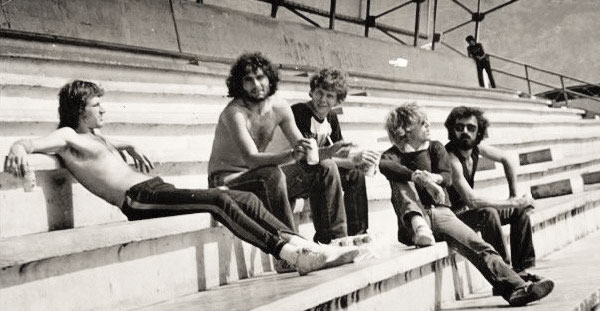
So a local rock scene was already established in the country and people had access to the heavier sounds of the rising NWOBHM. How hard was it to find other musicnas who wanted to play the same style of music as you? How did you form Resistencia?
Marco:
At our most creative time with Resistencia, we only had one member change in the line up, but fortunately we found a bassist who integrated into the band without any problems. Our attention was focused on finding someone with the right attitude, personal affinity, musical taste and who was willing to improvise. In our first three albums our compositions were a product of improvisations during rehearsals, even though we were starting with a riff or an idea that one of us had brought into the rehearsal. When we played live, improvisation was very important as well.
César, Ricardo, Víctor, and I studied in the same university, we met Rodrigo through a friend. we had the luck of finding each other at that time when we had the same restlessness and eagerness to do what we wanted to do.
One of the many things that stand out about Resistencia is the variety of lyrical themes. You've got political, historic, fantastic, and even some estoteric stuff going on such as in Templo de la Oscurida. Who wrote the lyrics, and why did you have such variety of themes? What caused the lyrical change between the first and second album?
Marco:
César wrote the lyrics, we all decided it would be that way. From the mysticism of Hecho en Venezuela we moved to more realistic lyrics about life in Estrategia Contra el Movimiento, but without abandoning the universality of our message. I think I recall that after many criticisms about mysticism and esotericism from Hecho en Venezuela César moved on to something more direct.
"What we were doing in the country was Rock Made in Venezuela. From Arkangel's part they were doing National Rock. A question of two flags..."
From what I read in your interview with The Corroseum from 2003, you guys had a little bit of friendly contact with Arkangel, but there was never much of a connection. Venezuela had other heavy metal bands during the early 80s. Why do you think Venezuela saw such professional development of unique bands early in the 80s compared to the rest of Latin America?
Marco:
From our part, what we were doing in the country was Rock Made in Venezuela. From Arkangel's part they were doing National Rock. A question of two flags, you simply make more noise if you compare and contrast two polarities but in the end each band on their own was contributing its strength to the nascent rock movement.
Ciargo is referring to how their label wanted to create an artifical rivalry between Arkangel and Resistencia for spectacle. Looks like nothing came out of that in the end and neither Arkangel or Resistencia were interested in such a ploy.
Marco:
I think by then those of us first venezuelan bands, we were more worried about having our own identity. The last four years, from 1975 to 1979, Disco Music had swept through the rock panorama, specially in Venezuela everything was new, there were no references. Back then we were unaware of what could be happening in other Latinamerican countries.
 The cover of your first album has different symbols next to each band member's name. Do these symbols have any special meaning? Are they influenced by Led Zeppelin?
The cover of your first album has different symbols next to each band member's name. Do these symbols have any special meaning? Are they influenced by Led Zeppelin? Marco:
They're symbols which represent the personality of each one of us. Yes, exactly, this was an influence from Led Zepellin.
Who was in charge of the album covers?
Marco:
The cover for Hecho en Venezuela was a consequence of the album name, it had to represent a product made for export. For Estrategia Contra el Movimiento the idea came from Santiago Pol, an important Venezuelan designer. For DaCapo we suggsted an idea to be developed by the label's designer.
Fortunately, YouTube has some live videos of Resistencia. It is obvious you were well received in Venezuela. What about in the rest of Latin America? Did you ever play live in neighboring countries like Colombia?
Marco:
No, we never left Venezuela. There was an attempt to get us to play in Bogotá in 1987 but nothing came through.
For live shows, how did you manage material which had been recording with multiple other instruments? Did you get extra musicians or added guitar lines to substitute those parts?
Marco:
We were always a five piece on stage, we never added additional instruments when we played live, Although we did use multiple other instruments when recording albums. With Zodiaco, we wanted to integrate an orchestra, but we couldn't pull it through.
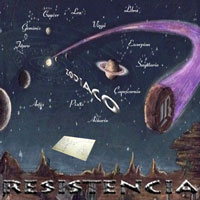 Zodiaco was a very interesting and technical conceptual demo-album from 1985 whcih was to be performed as a musical in theatres. However, by that time the political situation in Venezuela was getting worse and the project had to be stopped. You explained in the first interview with The Corroseum that you didn't have the intention to play heavy metal. Did you consider yourselfs hard rock? Did you not think your music was different enough from rock?
Zodiaco was a very interesting and technical conceptual demo-album from 1985 whcih was to be performed as a musical in theatres. However, by that time the political situation in Venezuela was getting worse and the project had to be stopped. You explained in the first interview with The Corroseum that you didn't have the intention to play heavy metal. Did you consider yourselfs hard rock? Did you not think your music was different enough from rock? Marco:
Our intention was the natural result of the five people who liked to play hard Venezuelan music. We simply flowed with the moment which was vibing in us.
Do you feel it's inappropriate for people to consider Resistencia as a heavy metal band? Would you prefer the band to be associated with 70s rock?
Marco:
Even though I confirm that we didn't consider ourselves a heavy band, only history will grant us the place in which we need to be.
Latin American countries are very segragated by class and race. Did such segregation tranalsate to musical genres back then? Was rock considered a working class genre, or for upper classes?
Marco:
Generally, rock groups come from the working class, specially hard rock. In the case of more progressive bands like Genesis, Pink Floyd, and others, they were college students or art students like Queen, and generally came not from wealthy families but well-off. We in Resistencia were more a part of these types of families.
"One of the messages from some song on Estrategia Contra el Movimiento made the national guard end the concert prematurely."
In the 80s, Venezuela didn't have insane military dictatorshpis like in Guatemala, El Salvador, Argentina, Chile, etc. Nonetheless, conditions for rockers were probably uneasy. Did you face problems with authorities for playing heavy rock?
Marco:
In 1993 we played in La Villa Panamericana which was a place housing the athletes from the Panamerican Games of that same year. Probably one of the messages from some song on Estrategia Contra el Movimiento made the national guard end the concert prematurely.
Sounds like the national authorities didn't want these sociopolitical messages to get attention at such a big international event. It might have been an embarrasment for the government.
I apologize in advance if this question is too personal, but sadly Rodrigo Yoma and Ricardo Escobar died several years ago. Did all band members get the chance to get together every now and then before they died?
Marco:
The last time I was in Venezuela was in 1996. I got together with César and Ricardo there for the last time. I was in touch with Rodrigo through e-mail. Our last contact was when he sent me some material he composed and wanted my opinion on it. With Luis and Victor we've gotten together more recently.
Are there any Resistencia songs you feel particularly proud of?
Marco:
Angeles Cayendo, Resistencia, Tierra prometida, Espejismo, PanaAmericanos, Más allá de la Historia, Fantasia, Hijos de la Democracia, Amor se escribe con besos, El Blues de la Leyenda Dorada, La Victoria y Preludio/ Hombre Libres del mañana.
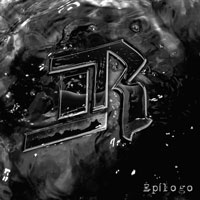 In 2015, Resistencia released its last album, Epílogo. Where you involved at all on this album? What motivated this reunion and last release?
In 2015, Resistencia released its last album, Epílogo. Where you involved at all on this album? What motivated this reunion and last release? Marco:
No, I wasn't involved in that at all. Ricardo got in touch with me to ask if I was ok with him continuing with Resistencia and of course I said yes [Ciargo left the band after the DaCapo album in 1984; Ricardo stayed until the release of Intenso in 2004. He died in 2010]. After that I didn't think anyone should consult me or my bandmates on anything unless it was regarding something inherent to the period when I was in the band, or the use of the band name after Ricardo died.
Quite a refreshing and humble take from Ciargo's part. How often do we hear about bands marred by their ego and infighting between members?
Since the 2010s, the global metal scene has been blessed with such obscure material from previous decades getting re-issued by labels which understand and share the fans' passion for this music. Thus, for heavy metal connosseurs in Latin America, it's a mystery why Resistencia's music has never been re-issued in any format at all. As you told me once before, the Mexican label Balboa Récords has the rights for the first Resistencia albums. For my part, I'm still working on a way to contact them and convince them to sell or deliver the rights to an underground metal label. If this were to happen one day, would you and the rest of the surviving members like to be a part of these re-issues?
Since the 2010s, the global metal scene has been blessed with such obscure material from previous decades getting re-issued by labels which understand and share the fans' passion for this music. Thus, for heavy metal connosseurs in Latin America, it's a mystery why Resistencia's music has never been re-issued in any format at all. As you told me once before, the Mexican label Balboa Récords has the rights for the first Resistencia albums. For my part, I'm still working on a way to contact them and convince them to sell or deliver the rights to an underground metal label. If this were to happen one day, would you and the rest of the surviving members like to be a part of these re-issues?
Marco:
It's been way too long and I have no idea how or when we could do these re-issues. In any case, yes, we would like to be aware of them when they happen.
Is there anything you'd want newer generations of fans to know about Resistencia?
Marco:
The heritage of Resistencia was the result of the sum of 5 people who couldn't have achieved what they did had they done it individually.
*Please note: the interview was conducted in Spanish. Some of Marco Ciargo's answers had to be paraphrased to improve the writing flow. However, the translations remain as literal and faithful as possible.


























